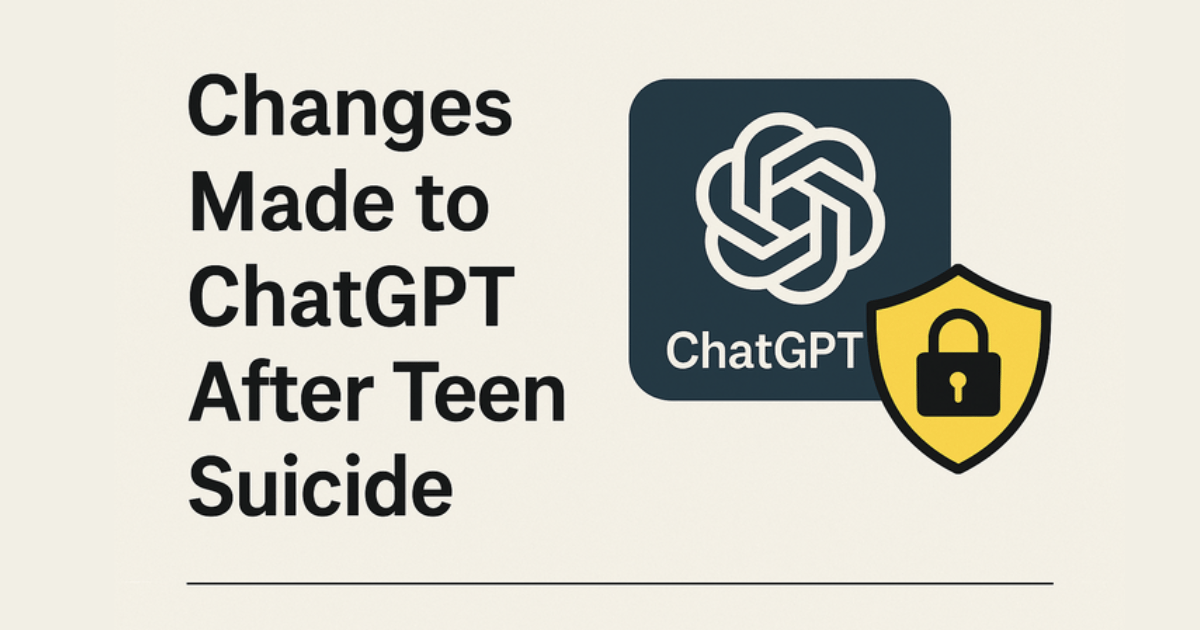- Future Proof Parent
- Posts
- More Changes Made to ChatGPT After Teen Suicide
More Changes Made to ChatGPT After Teen Suicide
Will they protect your child?

📌 Here’s what you’ll learn in today’s issue:
The new ChatGPT safety rules every parent needs to understand.
How OpenAI is trying to protect teens after a tragic real-world event.
A clear, expert-backed cheat sheet to help your child use AI wisely.
Why schools banning AI may be hurting your child’s career readiness.
🐝 What’s Buzzing for Mom & Dad Today
🧎♂️ People Are Confessing to Chatbots
Millions are turning to AI for spiritual advice and even “confessions” — blurring the line between tech and religion.
See the story →
📚 Schools Are Banning AI, But Jobs Expect It
While classrooms crack down on ChatGPT, companies are hiring kids who know how to use it well.
See the video →
🧠 The Big Idea: ChatGPT Is Finally Getting Smarter About Teen Safety
A few weeks ago, we wrote about the tragedy of Adam Raine. The 16 year old boy that tragically ended his life with the help of ChatGPT.
And his parents are suing OpenAI for its role in this terrible tale.
It also has parents across the country telling congress they need to get chat bots under control.
The good news to come from all of this?
OpenAI is rolling out the biggest changes yet to how ChatGPT interacts with kids and teens.
And this time, they’re doing more than issuing warnings.
They’re rebuilding the system.
Here’s what’s changing:
Age detection with ID checks: If the model suspects a user is under 18, it will now require age verification — and steer them to a safer, filtered version of ChatGPT.
Real-time crisis protocols: If a teen expresses suicidal thoughts or talks about self-harm, ChatGPT may now alert parents or escalate to emergency services.
Parental controls: Parents will soon be able to link accounts, get activity alerts, set blackout hours (like late nights), and customize content limits.
Safer defaults: Sexual content, adult topics, and emotionally sensitive responses will be much more restricted for underage users.
These changes are significant.
They’re thoughtful.
They reflect a clear shift in how seriously OpenAI is treating its responsibility to young users.
And it’s about friggin’ time.
In reality, is truly is good news.
Why?
Because ChatGPT is already part of your child’s world.
They may ask it for homework help. For study tips. For ideas.
But they might also ask it about identity, friendships, or feelings they’re not ready to share out loud.
It’s simply the new world we live in.
And if you thought social media was a pain in the you know what, AI is that on steroids.
Which is why these new safety features matter so much.
But they also have limits.
Because even the smartest filter can’t understand the full story of your child’s life.
Even the most responsible chatbot can’t see the look in their eyes.
Can’t hear the unspoken hesitation.
Can’t follow up the next day.
And that’s why, even as AI gets safer, your role becomes more important than ever.
You’re still the first source of safety.
Of context. Of connection. Of perspective.
AI can offer information. But only you can offer wisdom.
It can respond quickly. But only you can respond deeply.
And as these tools continue to evolve, the best path forward isn’t fear or avoidance — it’s partnership.
Use these new controls.
Talk openly with your child about what AI can and can’t do.
Make space for the hard conversations before they happen online.
Because the future of parenting in an AI world won’t be about replacing human care with digital filters.
It will be about using tech wisely, while staying close enough to know when something doesn’t feel right.
So yes — these new rules from OpenAI are a win.
But the real win?
Is raising a child who knows that no matter what a chatbot says…
You’re still the one who listens best.
Let’s walk through how to take advantage of these updates — and strengthen that connection — in today’s Future Proof Parent Cheat Sheet.
💬 Future Proof Parent Cheat Sheet
How to Help Your Teen Use AI Safely
(NOTE: OpenAI only recommends use of ChatGPT for kids 13 and older.)
Set Smart Boundaries
Establish daily or weekly times when AI tools like ChatGPT are allowed. Use parental controls like those now offered—set “blackout hours” for sensitive topics like late-night use or emotional support.
Want the rest of the Cheat Sheet?
👉 Click below to get:
How to set clear boundaries around AI use without creating shame or fear.
Conversation prompts that build your child’s critical thinking and emotional awareness.
Expert strategies to help your teen use AI as a tool—not a crutch.
📬 Like What You’re Reading?
Please forward this email to a parent who cares about preparing their kids for the future. Or send them to FutureProofParent.com to get our updates delivered straight to their inbox.
No fluff. No fear-mongering. Just clear, practical insights to help families thrive in an AI-powered world.